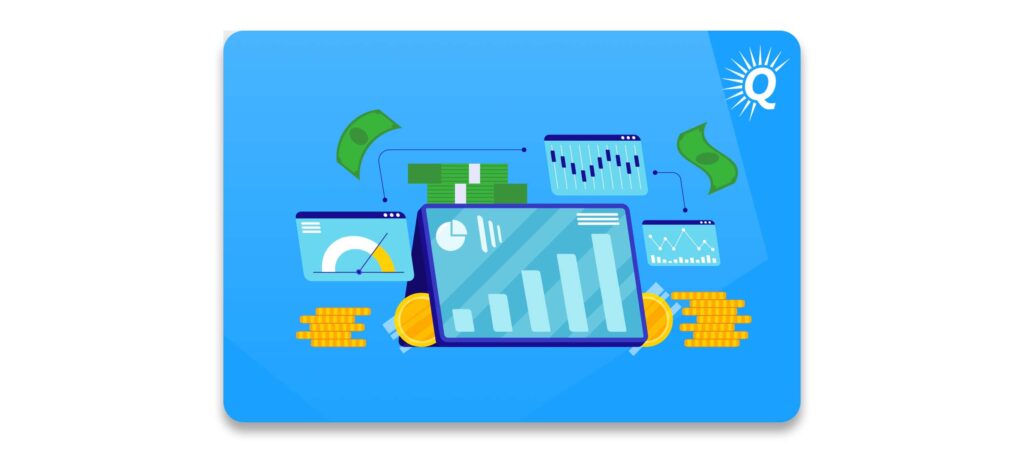Topics:
Never Miss a Beat - Get Updates Direct to Your Inbox
FILTER:


How to Sell Your Ecommerce Business for Maximum Value: Five Keys to Planning a Successful Exit
By Quiet Light
If you are like most entrepreneurs, selling your ecommerce business represents an unforgettable event in your career. In many cases, it can set you up for personal and financial freedom, giving you more ownership over your time. However, a successful exit is never guaranteed. In order to maximize your chances of closing a great deal, it is important to understand the process of how to sell an ecommerce business.
In this article, we discuss five key aspects of creating a successful exit. These include:
- Understanding the value of your ecommerce business
- How to know when to sell your ecommerce business
- Steps you can take to maximize the value of your ecommerce business
- Whether you should sell your ecommerce business directly to a buyer or work with a business broker
- How to prepare your ecommerce business for sale
Related Article: 4 Ways to Increase the Value of Your Online Business


Understanding the Value of Your Ecommerce Business
Before bringing your business to the market, it is imperative to have a clear understanding of the value of your ecommerce business.
How is value calculated? What are the different components of the valuation formula? And once you understand how value is calculated, what are the underlying factors influencing the value of your business?
“Before bringing your business to the market, it is imperative to have a clear understanding of the value of your ecommerce business.”
The SDE multiple method
There are many different methods for creating an accurate valuation of a business. The most widely used method in the online business space is the seller’s discretionary earnings multiple method, more commonly known as the SDE multiple method.
According to the SDE multiple method, the value of a business = SDE x a multiple.
In order to understand the SDE multiple method, let’s take a closer look at both the SDE and the multiple.
“According to the SDE multiple method, the value of a business = SDE x a multiple.”
SDE
The seller’s discretionary earnings is the total benefit that the business provides to the business owner. In other words, SDE captures the total money-generating capacity of the business. It is similar to profit, but it is distinct in several crucial ways.
More specifically, SDE is the pretax and pre-interest income of the business. Unlike profit, SDE is calculated before taking into account certain discretionary expenses. These include:
- Owner’s benefit
- Noncash expenses
- One-time investments
- Unrelated expenses or income
- Interest
Why not just use net profit instead of SDE? Sometimes, the value of a business is calculated by using profit x the multiple. However, SDE does a much better job of assessing the total value, or benefit, that the business provides to the owner.


For example, let’s say that in the previous year you expensed $10,000 worth of travel to your small business. This expense would be counted against profit. However, since this is a discretionary expense (i.e., the new owner would not necessarily need to incur this expense), it would be added back when calculating SDE.
When we discuss the multiple below we will see how this distinction can play a large role in shaping the overall value of the business. For now, it is worth noting the importance of adding back all appropriate discretionary expenses when calculating your SDE.
Failure to do so can result in a dramatically lower valuation. It goes without saying that this would cause you to leave easy money on the table when selling. Given the importance of including all add-backs, many business owners find it helpful to work with an experienced Advisor during the valuation process.
Thinking of Selling Your Business?
Get a free, individually-tailored valuation and business-readiness assessment. Sell when you're ready. Not a minute before.
The multiple
The multiple is a number that is multiplied by the SDE to arrive at the total value of the business. Multiples vary from business to business depending on certain qualities of the business. We will go into this in more depth below.
To elaborate on and conclude the example above, let’s say the business ultimately receives a multiple of 3. By adding back the $10,000 of travel expenses, you increase the business valuation by $30,000 (3 x $10,000 = $30,000). As you can see, getting your add-backs right is highly important.


You may be wondering, what determines the value of the multiple? Good question. The multiple serves to measure the underlying objective and subjective aspects of the business that determine its value to an owner.
While there are many factors that influence the value of a business (beyond SDE), these factors can be grouped into several categories. These are often called the Four Pillars of Value. They include:
- Growth
- Risk
- Transferability
- Documentation
Below, we take a closer look at each of these factors.
“There may be two similar companies with equal SDE, but if one is growing and the other is in decline, it is clear which one will be more valuable to interested buyers.”
Growth
Almost all serious buyers are looking to realize a healthy return on their investment when they purchase a business. The surest way for them to achieve this is to buy a business they expect to grow into the future.
As such, it is easy to understand why the past, current, and expected future growth trends of a company weigh so heavily on the overall value of a business. There may be two similar companies with equal SDE, but if one is growing and the other is in decline, it is clear which one will be more valuable to interested buyers.
In addition to the growth trends of a given business, serious buyers will also be interested in the growth trends of the industry as a whole. If you own a business in a rapidly growing industry, this will help to drive up the value of your business.


Risk
As an entrepreneur, you know that all business ventures entail risk. Some entail more risk than others, however.
The more risky a business is, the less valuable it is perceived to be, and vice versa. (This assumes all other things are equal, of course.) From the point of view of a buyer, they want their investment to have the best possible chance of working out. If it entails more risk, they likely won’t be willing to pay as much.
Increased risk comes in many forms, but in general, risk is incurred when any part of the business is built on a single point of failure.
For example, if your business relies on only one product for the bulk of its revenue, it is considered riskier than a business that has multiple successful products. In the second business, if one product takes a hit, there are many others to take up the slack and continue to drive revenue.
Likewise, if your business relies on one marketing channel—Facebook ads, for example—it will be more vulnerable to a large decline in sales if there is a sudden large change to the performance of that channel.
There are many other potential areas of risk. If one of your main products is the target of a patent infringement lawsuit, buyers will be hesitant to take on that risk. This, in turn, will drive down the value of your business.
Likewise, if an interested buyer determines that you have tenuous relationships with your suppliers, this could jeopardize your inventory management. This will signal an area of risk that qualified buyers may not want to take on.


Transferability
Your business is only valuable to a potential buyer if they can take over ownership without negatively impacting the performance of the business to a significant degree. The ease and success with which a business can be moved from one owner to another is referred to as transferability.
There are many issues that can impact the transferability of a business. For starters, if your personality or likeness is tied to the business, it may be hard for a new owner to maintain the same level of success once you are removed from the business.
In addition, the way that you organize and operate your business plays a large role in how easy it will be for a new owner to fill your shoes. If your operations are disorganized and chaotic, you will make it harder on a new owner. If, on the other hand, you have clearly automated processes and efficient teams built out to run your business, this will increase the transferability, and thus the value, of your business.
Documentation
Clear, concise, and orderly documentation plays a significant role in the overall perceived value of your business. This includes keeping orderly financial statements, creating clear standard operating procedures, and maintaining all relevant communication documentation with suppliers, customers, and business partners. They will also want to examine your customer service documentation.
During the buying process, a prospective buyer will want to review your financial statements thoroughly in order to determine whether or not the business represents a good investment decision.


They will want to be able to check performance metrics such as revenue, profit margin, expenses, and customer lifetime value, to name a few. The easier and more readily available this information is, the more they will be willing to pay for your business.
In addition to making it easier for an interested buyer to evaluate the performance of your business, orderly documentation signals to the buyer that you run your business in a responsible and professional manner. This helps assure them that they can expect fewer surprises throughout the sales process as well as once they take over ownership.
How to Know When to Sell Your Ecommerce Business
In a perfect world, it makes sense to sell your ecommerce company at a time that allows you to maximize your profit from the sale. While this is an excellent goal to work toward, there are many factors to consider that can impact the best time for you to sell your ecommerce business.
The best time to sell your ecommerce business will vary depending on a combination of factors, including:
- Business considerations
- External considerations
- Your personal situation
“If you determine that your skills are not suited to the continued growth of the business, it may be time to sell the business to someone who does have the appropriate skill set.”
Business considerations
In order to maximize the final sales price of your online store, it makes sense to sell during a period of consistent and strong growth.
If your business is already in a strong growth state, great. If it is not, it may pay to delay selling your business so you can work to create strong growth. While this may take some time and effort, it will pay off in the long run in the form of a higher sales price.


By using Google Trends to identify and launch new products or initiating new ecommerce marketing channels such as affiliate marketing, you can work to drive growth.
Aside from selling during a period of strong growth, it also makes sense to optimize the other Pillars of Value prior to selling your business. As a reminder, these include:
- Minimizing risk
- Creating clear documentation
- Increasing transferability
We will discuss these factors in more detail in a later section.
In addition, it is important to consider whether or not your skill set is appropriate for the current and future stages of the business. The skills and knowledge that are helpful in the beginning stages of business creation may not serve you so well in later stages.
If you determine that your skills are not suited to the continued growth of the business, it may be time to sell the business to someone who does have the appropriate skill set.
Buy a Profitable Online Business
Outsmart the startup game and check out our listings. You can request a summary on any business without any further obligation.
External considerations
External conditions are also important to consider when deciding the best time to sell your ecommerce business. For one, selling when your market or industry is in a period of growth will help to drive up the value of your business. This is beyond your control, however, and there may be other compelling reasons to sell your ecommerce business even if your market is in decline.
The season in which you sell your ecommerce business can also have an impact on the final sales price. In general, it is advisable to sell as you approach your busiest time of year when your profit margins are highest.
For most businesses, this is the holiday season. However, certain products or product ranges fluctuate regularly throughout the year for other reasons. If you sell winter clothing, for example, selling in the fall or winter when you get more sales could increase the value of your business.
Your personal situation
Business performance and market trends aside, there are several personal considerations you need to take into account when deciding on the right time to sell your ecommerce business.
Your current financial situation is one of them. If your material needs are met by the cash flow you receive from the business, you may not feel any urgency to sell. But if you are in need of a larger amount of cash for a down payment on a house, for example, you may wish to sell sooner than later.


In addition, you must take into account the other professional and personal opportunities available to you. For example, if you have another business idea you would like to initiate sooner than later, it may make sense to sell your current business. Likewise, if you want to free up more time for travel or family, you may feel compelled to sell in the near future.
Lastly, you may find it relevant to consider your current level of interest in owning and running your business. For some entrepreneurs, what may have started out as an exciting new endeavor may eventually become a source of stress.
If your heart is no longer in it and the business is a drain on your energy, it may be time to sell. Only you can make that decision.
If you have the option, though, it makes sense to leave ample time to plan your exit so you can maximize profit when it does come time to sell.
Maximizing the Value of Your Ecommerce Business
Maximizing the profit of your ecommerce business will serve the dual purpose of increasing your income prior to selling as well as boosting the final sales price you receive when you do decide to sell.
In order to maximize the profit of an ecommerce business, focus on optimizing the Four Pillars of Value discussed previously.
Implement strategies to drive growth
In order to maximize the profit of your ecommerce store, focus on driving revenue growth. As we have discussed, this may include launching new products, adding new marketing channels or optimizing old ones, or increasing your sales to your current customers.
Minimize risk
While you are implementing strategies to drive growth, it is prudent to work toward minimizing risk as well. Remember, risk occurs when the success of your business relies on any single point of failure.
If your ecommerce sales rely on only one successful product, add more to create diversity. If your digital marketing strategy only includes Facebook ads, consider engaging in social media marketing, affiliate marketing, or email marketing. At the same time, it may make sense to diversify your ad revenue by launching Google ads or Instagram ads.
If you face current or future patent issues, work with your legal counsel to address these. By doing so before you decide to sell, you will make your business more attractive to potential buyers.


Increase transferability
Assess how easily your business can be transferred to a new owner. If you determine there are barriers to a successful transfer, work to address these long before you plan to sell.
To begin with, ensure your personality or likeness is removed from the business. In addition, it may be helpful to build out a team to run your business operations. The more you automate your processes, the easier it is for a new owner to take over.
This will serve the purpose of making your business easier to manage while it is under your control, as well as increasing its value when you do decide to sell.
“If you determine there are barriers to a successful transfer, work to address these long before you plan to sell.”
Create clear documentation
Are your documentation practices up to par? Do you keep clear financial statements? Likewise, have you created and documented your standard operating procedures?
If the answer is “no” to any of these questions, get to work putting your documentation in order. Interested buyers want to see an organized, well-run business when you open your books. The effort you put in now to clean up your documentation will make your business easier to run in the short term. In addition, it will also help you achieve a higher sales price at the time of exit.
“The effort you put in now to clean up your documentation will make your business easier to run in the short term.”
Selling Directly to a Buyer vs Using a Broker
Many entrepreneurs planning their exit wonder whether they should sell their online store on their own or enlist the help of a business broker. There are several factors to consider when making this decision.
Selling privately
It may be tempting to sell your online business on your own as it avoids incurring the costs that hiring a business broker, or Advisor, entails. Depending on your skill set and knowledge base, this may be an acceptable route for you to go.
When selling privately, the entirety of the exit process lands on your shoulders. This includes creating an accurate valuation, assessing and optimizing your business operations, listing your business, evaluating offers, negotiating with the buyer, and much more.
While some owners are happy to take this on, others may not be. The ultimate question is which route will lead to a better exit outcome for you as the owner.
The benefits of hiring a business Advisor
A qualified business Advisor will help you throughout the sales process. Ideally, the goal of a broker should be to maximize your sale in such a way that the extra value they bring more than offsets their cost.


Oftentimes, this value comes in the form of a higher sales price. By helping you accurately assess your business and create a custom optimization plan, they can allow you to achieve a more profitable exit. This begins with creating an accurate valuation of your business.
The more competition there is to purchase your business, the higher the offers you will receive. A broker can help create this competition by tapping into their extensive network of potential buyers, ultimately driving up the number of qualified offers.
Once you narrow down the field to evaluate a specific offer, the broker will be with you through every step of the sales process, including:
- Evaluating the offer
- Negotiating with the buyer
- Navigating the paperwork, including the letter of intent and asset purchase agreement
- Assisting with the due-diligence process
- Closing the deal
In addition to creating a more profitable exit, an experienced broker will help create a smoother transaction process. By doing so, they will instill a sense of confidence and peace of mind in a potentially stressful situation.
“Ideally, the goal of a broker should be to maximize your sale in such a way that the extra value they bring more than offsets their cost.”
How to Prepare Your Ecommerce Business for Sale
Once you do decide to sell, you may be wondering what you need to do to prepare your business for the market. What steps should you take before listing your business for sale?
Preparing your online business for sale can be a lengthy process. In this section, we will review some of the most important steps to take before selling your business.
Find the right business Advisor
If you decide you would like to hire a business Advisor to help you sell your ecommerce business, the first step is to find the right one. When searching, it is helpful to evaluate a potential Advisor based on several factors, including:
- Your rapport
- Their valuation method
- The extent and quality of their network
- Their area of expertise
- Whether your goals and values align
Get a valuation
Once you have found an Advisor to work with, they will conduct a valuation of your business using the SDE multiple method we discussed previously. This will assign a numeric value to your business as it currently stands.


In addition, it will also identify the strengths and weaknesses of your business. This will allow you and your Advisor to create an appropriate business plan to optimize your company.
“As the offers start coming in, you and your Advisor will work together to sort through them and choose the best one for your goals.”
Optimize your business
Depending on the urgency with which you wish to sell your ecommerce business, you will then implement your optimization plan. This will likely include addressing the Four Pillars of Value as we discussed in a previous section. The specific needs of your business will depend on its current state.
Create your marketing package
After you have implemented your optimization plan and you decide it is time to sell, you and your Advisor will work together to create your marketing package. The marketing package is used to present your business and its relevant information to potential customers.
List your business for sale
Once your marketing package is complete, it is time to list your business! You may list your business on public business listing platforms. In addition, your Advisor will get the word out to their network in order to attract more interested buyers.
As the offers start coming in, you and your Advisor will work together to sort through them and choose the best one for your goals.
Thinking of Selling Your Business?
Get a free, individually-tailored valuation and business-readiness assessment. Sell when you're ready. Not a minute before.





